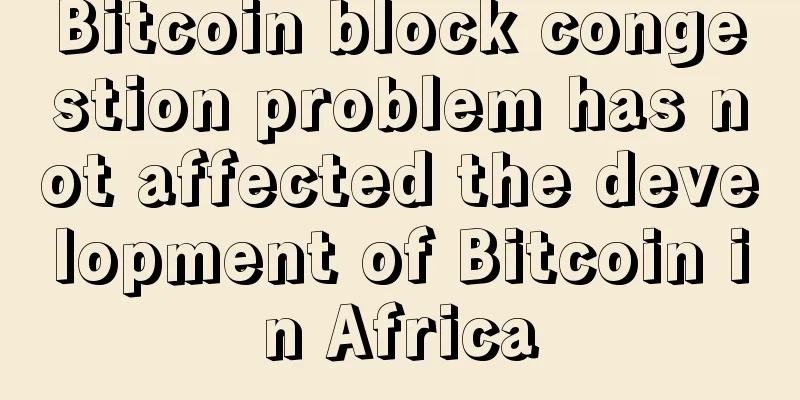Bitcoin block congestion problem has not affected the development of Bitcoin in Africa

|
Golden Finance News - As Bitcoin blocks have filled up, transaction fees and confirmation times on the Bitcoin network have increased dramatically over the past year. Bitwala is a Bitcoin-based international money transfer startup Image source: Golden Finance Some people believe that this problem is very detrimental to the development of Bitcoin in developing countries, but Bitwala CEO Jorg von Minckwitz told BitcoinMagazine that this is not the case. Bitwala is a Bitcoin-based international money transfer startup that aims to bring blockchain banking services to everyone on the planet. According to Minckwitz, changes to the Bitcoin network over the past year have not had much impact on popular Bitcoin use cases on the continent. While Bitwala believes that off-chain solutions like the Lightning Network are the future of the Bitcoin network, as a company it still likes Bitcoin as it is. What is Bitcoin used for in Africa?Minckwitz said South Africa is the most active region in terms of sign-ups and site visits, but other regions are also seeing increasing sign-ups and interest. Bitcoin network congestion does not cause problems in Africa. Image source: Golden Finance According to the startup, 30% of new users came from Africa and Southeast Asia.
Mickwitz went on to say that Bitwala has seen a number of businesses, particularly in Nigeria, using bitcoin to provide banking services such as providing financial loans.
Kenyan fintech blogger Michael Kimani shared a similar view in an interview with CoinJournal, arguing that Bitcoin fills the gap between the country’s multiple online payment systems. Bitcoin network congestion not causing problems in AfricaWhen asked if Bitcoin’s high transaction fees and long confirmation times had a negative impact on Bitwala,
Some in the Bitcoin community would certainly disagree with this statement; after all, the Bitcoin white paper discusses “an electronic payment system based on replacing trust with cryptographic proofs.” That being said, as early Bitcoin users such as Hal Finney, the first person to receive Bitcoin from Satoshi Nakamoto, pointed out, Bitcoin has gold-like properties, which makes it an important store of value.
Bitcoin as a means of storing value should not be forgotten in Africa. "The currencies of most African countries are unstable, and sometimes people lose everything overnight. We use Bitcoin as the first solution to control our own funds," he said. Scaling Bitcoin off-chainIn Minckwitz's view, the best way to scale Bitcoin is to scale off-chain. In addition to improving the organization of user payment flows and using bank-like settlement technology, Minckwitz also hopes to further improve the transaction process through the activation of segregated witness and the application of the lightning network. Speaking of Lightning Network, he said:
|
<<: Can Bitcoin build a truly modern financial system and help the poor escape poverty?
Recommend
Is it the US government or Bitcoin that created ISIS?
Former Federal Reserve Chairman Ben Bernanke both...
What kind of people with palmistry are suitable for development in other places?
People with a branched travel line under the life...
Bankless: How to ride the meme wave? These 5 tools are not to be missed
We are back in the bull market surge. Token price...
Is it good for men to have forehead wrinkles? What are the consequences of having too many forehead wrinkles?
A man with a forehead wrinkle It is very rare to ...
How to be considered full of heaven
When we watch TV or read novels, we often hear fo...
Ambitious women have strong competitive spirit and are never afraid of getting tired.
With the changes and development of society, many...
What does it mean for a man to have a mole on his forehead? He will have a successful career and a bright future!
What does it mean for a man to have a mole on his...
What does it mean when eyebrows are used to represent longevity?
Many parts of the face are unique and representat...
Mole diagram of facial features: moles on the face of men, women, men and boys
Most people don't care too much about moles o...
What are the wrinkles on both sides of the mouth called?
In our lives, almost everyone will have loose ski...
Huobi and OKCoin are deregistered in China; Binance launches tax reporting API and removes some fiat currency trading pairs
Since May, domestic regulatory agencies have step...
A woman with a particularly kind heart has a round forehead.
As the saying goes, the face reflects the heart. ...
Face analysis: ears
Face analysis: ears People with extremely regular...
Canadian asset management company CI Global applies for the world's first Ethereum ETF
Asset management firm CI Global filed a prospectu...
Here is a quick guide to Huobi USDT-margined perpetual contracts
On October 26, Huobi officially launched the USDT...









![[Heavy News] A-share listed companies invested 580 million to build IPFS distributed storage project](/upload/images/67e6835fc2698.webp)